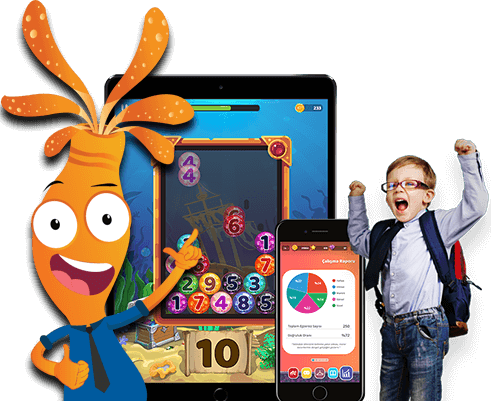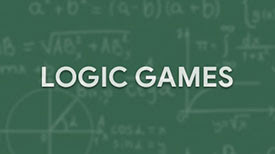Before starting with the best approaches, you may want to check your abilities with the games below. They are suitable for you and your kids. Don’t forget it is important to be aware of yourself to boost your mental skills.
Why Are Logical Thinking Skills Important?
Logical thinking is the ability to make a rational conclusion by analyzing a situation, and it helps the human mind to make a distinction between right and wrong.

Keep in mind that well-developed logical thinking skills also promote our skills such as analytical thinking, reasoning, math, and problem-solving.
It is important to understand what logical thinking meaning is and how it affects our daily lives. To have a better understanding, you can look at the positive effects below.
- Rational people can easily correlate events and objects.
- The chance of rational people making mistakes is likely to lower.
- Children who have strong logical thinking skills are successful at school because they can establish cause and effect relations.
- Rational individuals are likely to be more successful at work because they develop the right strategies.
You are lucky because we’ve prepared eight easy-to-apply tips, as well as the best games, to enhance your and your children’s logical thinking skills.
We’ve also shared examples from our daily lives for helping your children to understand the logic behind logical thinking. You can use all of these when you want to train your brain or help your kids for this purpose.
How to Improve Logical Thinking?
Like almost every skill, logic can also be improved and developed through proper exercises and activities. Here are some of the best tips that will help you do just that!
1. Logic Exercises
Games are with no doubt the best way of teaching children something. And when it comes to mental development games, MentalUP is the best!
With these games, you can help promote your children’s: logical reasoning skills, planning skills, spatial perception skills, logical thinking skills, mathematical thinking skills, and much more!
2. Socializing With Others
Socializing, in other words building new relationships, will expand your perspective. This way, you can gain more and more logical thinking skills with the ability to approach situations and thoughts from different angles.

Encourage your children to make new friends at their school, neighborhood, or at the park. It will not only help enhance their logical thinking skills but it will also help them build healthy social skills.
3. Creative Hobbies
Although the left hemisphere of our brain is responsible for logical thinking, creative activities, which are mainly ruled by the right hemisphere of our brain, help promote logical thinking. Therefore, encourage your children to engage with creative activities such as playing imagination games, drawing, painting, writing, and playing music.

Well, how do these help with logical thinking?
For example, learning a new instrument requires deep thought and concentration. During this process, your children will gain the ability to solve more problems with flexibility and ease.
In addition, as these tasks require creativity, creative thinking naturally develops problem-solving abilities that can help your children become better at school.
Becoming a logical thinker requires improvement in different areas, such as brain dominance!
Do you know which brain dominance you or your children have? Feel free to take our free brain dominance test and reveal the secret! 🧠
You can also read our article to learn more about the right brain - left brain and the difference in between. There are study tips based on brain dominance results! 📚
4. Question Events
One of the best ways to enhance your logical thinking skills is to ask questions about things you typically accept as a fact. Making a habit of asking such questions helps you view situations more completely and allows you to approach situations more logically and creatively.

You can come up with simple games to apply this tip to your children and use it as one of the most effective problem-solving activities for kids. For example, start with a sentence that is a result of an obvious fact and as your children to complete it:
Parent: “It is cold because…”
Child: “… it is snowing/winter/raining.”
Practicing this activity will also help your children build a sense of responsibility for their actions and behavior, as well as teach them how to think faster.
5. Read Mystery Books and Stories
Here is one stone two birds situation. You can advance your children’s reading skills and promote their logical thinking skills by simply engaging them with mystery.

There are plenty of mystery stories and books that your children will enjoy reading as they try to solve the enigmas within.
6. Learn/Discover a New Skill
This tip is quite close to the third tip above, but there is no such thing as too much learning. Creative or not, learning a new skill can help sharpen your logic skills.
The more you take the opportunity to learn something new, the more you will be able to think logically and strategically.

Encourage your children to learn something new! Depending on their age it can be; learning a new language, learning a new sport, or even learning a new game.
Not only will practicing every day help create a mindset of thoughtfully, and logically, approaching problems and situations, but it will also develop a new skill that your children can enjoy!
How to think logically? It's easy: Download MentalUP that is developed by academicians, pedagogues, and game designers to improve logical skills! 🙌 With over 150 gamified exercises, you can learn how to increase logical thinking. 🥳
Track the logical skills development of yourself or your children with MentalUP's detailed report tools! 📊
7. Brain Teasers & Puzzles
Brain teasers and puzzle games like tangrams for kids are always fun activities. However, did you know that it helps improve logical thinking skills?

As children try to find the answer to the questions, they are forced to think strategically and logically. If you’re in search of the best brain teasers, check out our Pinterest board for 400+ free brain teasers!
8. Mindfulness
Extreme stress is one of the worst enemies of logical thinking. And, it may come as a shock but most children experience more stress than adults do 😞

When your children’s stress levels are manageable, they are more likely to have an easier time focusing and making logical decisions. And one of the best ways to manage stress is practicing mindfulness.
Children who experience stress, attention deficit, or anxiety can lack logical thinking skills. Supporting kids with educational and entertaining apps can be very effective in such conditions. ✅
MentalUP is an award-winning program that supports becoming a logical thinker. With 150+ gamified exercises, offer lots of fun while improving. See you never, stress! 👋
Difference Between Logic and Reason
We hear you say “But what is the difference between reason and logic? Aren’t they the same thing?” To begin with, “logic” is a noun, and “reason” is both a noun and a verb.
You can “reason with a person” but you can’t logic with someone. In addition, every logic can be reasoned but not every reasoning can be based on logic.
That said, the primary difference between logic and reason is that reason can be subjective, whereas logic is actual science that follows clearly defined rules and tests for critical thinking.
Logic also requires tangible, visible, or audible proof of a sound thought process by reasoning.
For example, you can debate or “reason” with someone that the water is cold, however, the fact that water’s freezing temperature is 0℃ is not up for debate as there is a logic behind it.
Logic Examples
Here are some everyday logic examples that will help you and your children understand the concept of logic and logical thinking even further.
1. Informal Logic
Informal logic is what we usually use for daily reasoning processes. This is the reasoning and arguments you make in your personal exchanges with others and they are more subjective rather than based on facts.
Example 1
- Premises: Fred walked under a ladder on his way to work. Fred got fired from work today.
- Conclusion: Walking under a ladder is bad luck.
- Explanation: This is an assumption based on superstition. It has no fact-based logic.
Example 2
- Premises: My sister is a celebrity. I live with my sister.
- Conclusion: I am a celebrity.
- Explanation: There is more to proving fame that assuming it will rub off.
Inductive logic examples can also be examined under this category. Inductive reasoning is made by using specific information and to make a broad generalization that is considered probable. As the reasoning is based on repeated experiences, the outputs are not always accurate.
Example 1
- Premises: An umbrella prevents you from getting wet in the rain. Sarah took her umbrella, and she did not get wet.
- Conclusion: In this case, you could use inductive reasoning to offer an opinion that it was probably raining.
- Explanation: Your conclusion, however, would not necessarily be accurate because Sarah would have remained dry whether it rained and she had an umbrella, or it didn't rain at all.
Example 2
- Premises: Thirteen out of the twenty houses on the block burned down. Each fire was caused by faulty wiring.
- Conclusion: If more than half the homes have faulty wiring, all homes on the block have faulty wiring.
- Explanation: There is a likelihood to the conclusion, however, it is not verifiably true.
2. Formal Logic
Formal logic requires deductive reasoning and the premises must be based on facts. The premises should lead to a formal conclusion.
Example 1
- Premises: Every person who lives in New York lives in the USA. Everyone in the USA lives in North America.
- Conclusion: Every person who lives in New York lives in North America.
- Explanation: The premises are based on geographical facts.
Example 2
- Premises: Bicycles have two wheels. Jenny is riding a bicycle.
- Conclusion: Jenny is riding on two wheels.
- Explanation: The premises are fact-based so the conclusion is true.
3. Symbolic Logic
Symbolic logic, as the name applies, focuses on how symbols relate to each other. It assigns symbols to verbal reasoning in order to be able to check the veracity of the statements through a mathematical process. You typically see this type of logic used in calculus.
Example
- Propositions: (A) If all mammals feed their babies with milk. (B) If all dogs feed their babies with milk. (C) All dogs are mammals. The Ʌ means “and,” and the ⇒ symbol means “implies.”
- Conclusion: A Ʌ B ⇒ C
- Explanation: Proposition A and B lead to the conclusion, C. If all mammals feed their babies with and so do dogs, it implies all dogs are mammals.
4. Mathematical Logic
It goes without saying that all math problems are based on logic with each having a single outcome based on facts. As mathematical logic applies formal logic to math, mathematical logic and symbolic logic are often used interchangeably.
MentalUP Logic Games increase children’s school success and support their mathematical intelligence development.
It also helps them learn how to be logical by strengthening their logical thinking and reasoning abilities. To develop logic, memory, reasoning, and problem-solving skills, make the best decision and get MentalUP brain games! 🤩🎊






